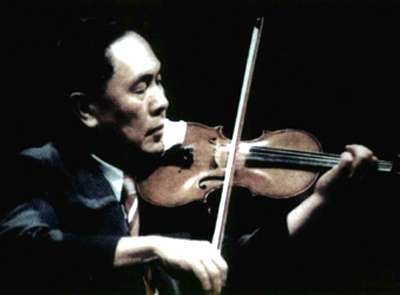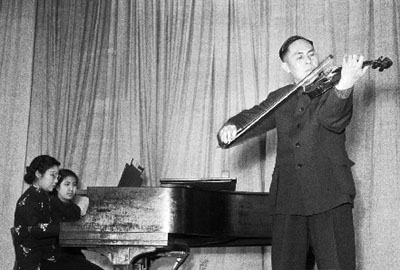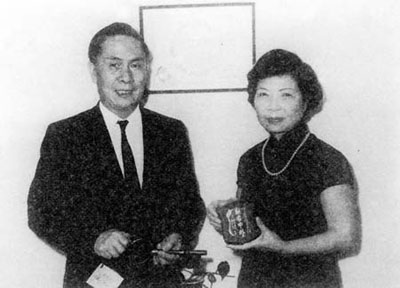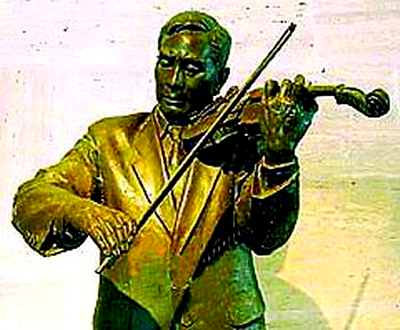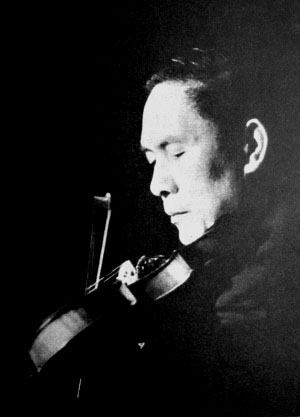His tune of Nostalgia having echoed in China for 70 years, Ma Sicong, the country's great composer and violinist, can finally return home.
Ma Sicong (1912-1987)
The prominent musician composed a number of famous symphonies and concertos, like Nostalgia, Motherland, and Song of the Mountain Forest, using Chinese folk idioms. He devoted his life to building a national music identity, but was plagued by bad luck. Ma died in Philadelphia in 1987, at the age of 75. At the time of his death, he had not set foot in his homeland for 20 years.
The Chinese government has made plans with Ma's family to bring the musician's ashes home this autumn and bury him in his hometown in Guangdong Province. Ma Rulong, the musician's eldest son, plans to accompany his father's ashes, if health permitting.
The family's misfortune dates back to 1966, the beginning of the Cultural Revolution (1966-1976). Ma was exiled to Hong Kong with his family, and later moved to America. His retreat, after he was accused of betraying the country, caused the deaths of his second eldest brother, his mother-in-law, his niece, and his chef. It was not until 1985 that the Chinese government cleared his name. Two years later, he passed away in the United States from a heart attack during an operation to cure his pneumonia.
Ma Sicong, one of China's prominent musicians, was playing violin for guests from North Korea, on February 23, 1953. (photo: Xinhua)
Born in 1912 to a family of academics, Ma showed his talent in music when he was just a child. He went to Paris at the age of 11 to study violin, returning to China in 1929. Ma won himself fame as the country's young musical genius by holding concerts in Hong Kong, Guangzhou and Shanghai.
In 1931 he returned to Paris using government subsidies. After his return home a year later, he was appointed as the headmaster of China's first private music college, where Ma met the love of his life, piano accompanist Wang Muli; they married soon after. In 1937, when China fought the War of Resistance Against Japan, Ma composed the touching concerto Nostalgia, which was the pinnacle of his career.
In 1948, the patriotic musician refused an invitation from John L. Stuart (1876-1962), the American Ambassador to China, to move to America. It was a year before the founding of the People's Republic of China. After China's liberation, Ma helped the country to set up the Central Conservatory of Music in 1950 and took the headmaster's position. His devotion proved fruitful as several students won international music awards during the 1950s.
Ma Sicong and his wife in the United States
But his work was cut short abruptly in 1966 when a group of zealous youth, including some of his students, rushed to his home, humiliating his family. The revolutionists stunned his wife, who was threatened and forced to confess her husband's "guilt". She later fled from Beijing with her children.
Yet, Ma was reluctant to leave. In 1966, he could still hear the broadcasts of his Nostalgia. He was determined to stay in China as long as the country was still broadcasting his composition. But when Nostalgia was cut from programs a year later, the musician sunk into a depression. He had to make a choice: leave China, or live in devastation.
His family was illegally ferried in a small boat to Hong Kong, and after staying there for a while they were allowed to move to America. People discovered Ma in New York a year later, and called him a traitor to the country. He wrote music for the ballet Sunset Clouds and composed the opera Rebia while living in the states.
Ma Sicong's statue
Xu Chi (1914-1996), the famous Chinese author and Ma's friend, wrote after his visit to Ma's family in 1984: "To my surprise, Ma kept his graceful manners. He was as passionate, optimistic, and devoted as before, though I thought I sensed a slight difference in him. I believed there was a slight bitterness in his life. However, now I realize that it was actually a deep-rooted hurt that I had not understood."
In 1985 the country announced Ma's innocence and the Central Conservatory of Music invited him to the school's 35th anniversary. Some students who had previously badmouthed their headmaster expressed their regret in letters. Ma hoped to be home that year, as he wrote in his diary: "The land resumes in spring and I am approaching my motherland." Unfortunately, he never made it.
Two years later an operation, which Ma had worried little about, cut short the old man's dream to be back in his motherland.
In 2002, Guangzhou City set up a memorial hall for Ma Sicong to commemorate his contribution to the country's music. Ma's family sent two violins and 1,400 pages of compositions of the late master to the museum. Over the past year, the Chinese government has discussed with Ma's family the possibility of bringing his ashes back to China. Finally, this autumn, the musician can return home.
(China.org.cn by Wu Jin, August September 17, 2007)

